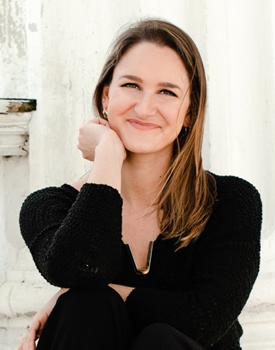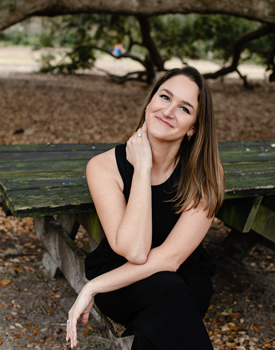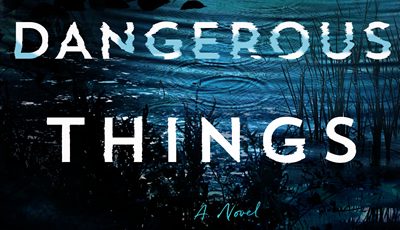

Features On the Cover: Stacy Willingham
Tapping into a Mother’s Worst Nightmare
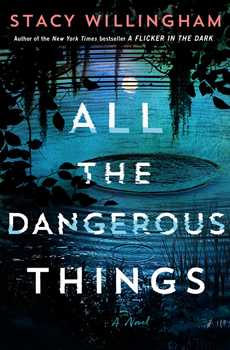 By Dawn Ius
By Dawn Ius
Stacy Willingham’s debut, A Flicker in the Dark, enjoyed the kind of reception most writers only dream of—it hit the New York Times bestseller list, was optioned for film, and solidified her place as one of the genre’s “authors to watch.” The accolades are well-deserved—Willingham writes with the confidence and authenticity of someone who’s been doing it her entire life.
But as most authors know, sophomore books can be tricky. The pressure, the expectations, the potential to slip into “What if my first book was a fluke?” mode. If Willingham had those feelings, she’s hidden them well—ALL THE DANGEROUS THINGS is an emotional and suspenseful knock-out of a second book, a masterclass in storytelling.
We meet Isabelle Drake on day 364 of sleepless nights. She’s basically been a zombie since her toddler son, Mason, was kidnapped from his crib almost a year ago, while she and her husband were sleeping in the room next door. The case has gone cold, and in an attempt to keep the public and the police looking for her son, Isabelle becomes a fixture on the true crime circuit, speaking out whenever she can, reliving those moments leading up to the kidnapping as best she can remember. Her husband—who has since left her and started dating someone new—isn’t impressed.
But Isabelle does catch the attention of a podcaster named Waylon, who is keen to help. The trouble is, in doing so, he’ll have to do a deep dive into Isabelle’s uncomfortable past, making the question of “who done it?” much murkier.
ALL THE DANGEROUS THINGS is the kind of book you read in one sitting—and then think about for weeks later. In this interview with The Big Thrill, Willingham talks about “going dark” for her craft, the inspiration for this compelling read, and much more.
I didn’t think you could top A Flicker in the Dark, which was one of my top reads last year, but ALL THE DANGEROUS THINGS is extraordinary. I’d love to hear a bit about the moment or incident that may have sparked the idea for this book.
Thank you so much! The first seed of inspiration happened when I was reading an article that followed a man at a true crime conference—only he wasn’t there as an attendee, he was there trying to raise awareness about his sister’s unsolved murder. He knew that her story being featured on an episode of Dateline or a popular podcast would do wonders for the case, but it was also incredibly hard for him to talk about her murder as something with a plotline worthy of other people’s attention. The juxtaposition between the conference attendees, who were essentially there for entertainment, and the various victim family members, who were there for publicity and networking, struck me as incredibly jarring. It made me want to explore the complicated emotions that must come with trying to cater to the true crime craze when a violent crime has affected you personally.
The second seed came a few months later when I had an unsettling experience with my husband talking in his sleep. He said something very bizarre, but when I woke him up to ask him about it, he had no memory of it whatsoever. That got me thinking about various sleep disorders, and I had a bit of an epiphany when I realized that insomnia (which I struggle with on occasion) and sleepwalking are basically opposites of each other. If a bout of insomnia gets bad enough, you’re essentially losing control of your own mind; if you’re sleepwalking, on the other hand, you’re losing control of your own body. Which is more terrifying?
One of your writing superpowers is the ability to evoke emotion, and wow, I was really in deep with Isabelle Drake. Even Isabelle’s ability to function—albeit barely—on so little sleep felt so authentic. What did you need to do to “go there” with your writing?
One of the challenges of writing thrillers is trying to make a situation that very few people have first-hand experience with feel relatable. With A Flicker in the Dark, most people (thankfully) don’t know what it’s like to be the daughter of a serial killer, but most people can relate to what anxiety, paranoia, and fear feel like. With ALL THE DANGEROUS THINGS, most people don’t know what it’s like to be searching for a missing child—but everyone knows what it feels like to be groggy, confused, and sleep-deprived. When writing my stories, I try to dig into my own memory to find instances where I felt the particular sensations I’m trying to recreate. For example, what did it feel like that one time I was up until three in the morning because I couldn’t sleep? Or that time in college when I stayed up for 48 straight hours while studying and locked my keys in my running car? Once I have those memories in mind, I just apply those universal emotions to a situation that isn’t universally relatable and hope it translates.
It’s not a spoiler to say that at the start of the book, Isabelle’s toddler son, Mason, has been missing for a year, taken from his crib in the middle of the night. I imagine you needed to do some research into true life cases where this has happened. Was there anything that surprised you?
Yes, I did a lot of research on missing children’s cases, and I would say one thing that really surprised me is how quickly the public places blame on the parents. In almost every famous case, there is some element of speculation around how the parents could have either been directly involved or how they were somehow being neglectful when the child went missing. Of course, this speculation is understandable when you look at the statistics—most of the time, children are taken by a family member or acquaintance—but I started thinking about how horrible that would feel. In addition to being worried sick about your child, absorbing all that blame would be debilitating.
I love the structure of ALL THE DANGEROUS THINGS—the scenes with Isabelle as a child really ramped up the suspense and kept me guessing as to how the timelines connected. I was not disappointed! What challenges, if any, did the structure present as you were writing?
There are always challenges that come with creating a story set in multiple timeframes, the most obvious being that you don’t want the timeline jumps to be confusing for the reader. Nothing ruins the mood of a story faster than having to re-read a page because you don’t know what timeline you’re in. In addition to that, you don’t want one timeline to overshadow the other. An over-emphasis on the “past” timeline can slow down the “present” timeline, affecting the tension of the entire story… but an under-emphasis on “past” can make those chapters feel distracting and unnecessary. For that reason, I took a lot of time trying to ensure that every past scene was essential to the present storyline. I also wanted the past to contain just as much tension as the present. Finally, I wanted the timelines to play off of each other, giving the entire book a cohesive feel.
Though I know everyone has their own way of processing trauma, obviously I wasn’t a fan of Isabelle’s husband. But Waylon, the podcaster who wants to tell her story, is fantastic. Can you share a little about how he came into shape for you?
Yes, Waylon is such an interesting character to me! I suppose the idea for him came to me because I’ve always thought that being a true crime podcaster would be a fascinating job: You’re essentially an investigative journalist, but because many podcasters work for themselves, it’s impossible to know what their true intentions are. Why do they decide to get involved in certain cases? How far is too far when it comes to investigating a story? Why get into that profession in the first place? Because many of them are simply “armchair detectives,” or everyday citizens who have an interest in solving crime, they also don’t have to deal with the typical red tape that a traditional journalist would face when digging into an active investigation. For all these reasons, I think they make for pretty interesting characters. You can take them in so many different directions.
ALL THE DANGEROUS THINGS is first and foremost a gripping psychological thriller. But you also touch on a number of themes—grief and loss, the role of media in true crime, the long-lasting effects of childhood trauma, etc. What do you hope readers take away from this story?
I suppose I just hope my stories help readers put themselves in somebody else’s shoes for a second. I hope they help people think about different perspectives, or maybe even give a character a little grace for making a decision the reader themselves might not agree with. I enjoy writing characters with rich backstories and complicated pasts because I think that’s the best way to understand a person: How did their life circumstances lead them to this moment, to make this decision? If we could understand and empathize with the path someone had to walk in order to get to where they are today, maybe we’d all be a little more understanding and accepting of their various choices.
A Flicker in the Dark received—deservedly—the kind of acclaim most writers dream about. Sophomore books are statistically harder to write, and yet ALL THE DANGEROUS THINGS feels effortless (even though clearly it was not). How did you overcome the pressure of getting this book “right”?
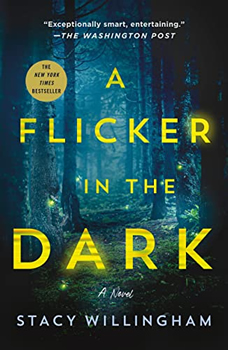 I have my wonderful agent to thank for that one. When we sold A Flicker in the Dark and I was suddenly on the hook for a second book, he told me to write that second book before my first one ever hit the shelves. To your point, the hardest part about writing a second book—or a third book, or a fourth book—is the pressure of it all. Pressure of impending deadlines, yes, but also pressure from the public. He knew better than I did that the reviews of A Flicker in the Dark, both good and bad, would inevitably affect my writing, so he urged me to get ALL THE DANGEROUS THINGS down on the page before any of that even started. As a result, when I wrote this story, I didn’t yet know what it felt like to have a bad review kill my confidence, or to have a good review make me feel like my next book had to be even better. This book is completely and totally mine because I was able to write it with such a clear head. I’m so grateful for that advice.
I have my wonderful agent to thank for that one. When we sold A Flicker in the Dark and I was suddenly on the hook for a second book, he told me to write that second book before my first one ever hit the shelves. To your point, the hardest part about writing a second book—or a third book, or a fourth book—is the pressure of it all. Pressure of impending deadlines, yes, but also pressure from the public. He knew better than I did that the reviews of A Flicker in the Dark, both good and bad, would inevitably affect my writing, so he urged me to get ALL THE DANGEROUS THINGS down on the page before any of that even started. As a result, when I wrote this story, I didn’t yet know what it felt like to have a bad review kill my confidence, or to have a good review make me feel like my next book had to be even better. This book is completely and totally mine because I was able to write it with such a clear head. I’m so grateful for that advice.
Is there anything you can share about the TV option for A Flicker in the Dark? ALL THE DANGEROUS THINGS has a similar cinematic feel—it wouldn’t surprise me if it was optioned as well. Anything happening on the Hollywood front that you can tell us about?
Nothing concrete to share from Hollywood just yet!
What can you share about what you’re working on next?
I’m writing my third novel at the moment! It’s another psychological thriller, though it’s probably the most different of my three books thus far. It’s my take on a dark academia story focusing on a house full of female roommates who find themselves in the middle of a murder investigation after one of the fraternity boys next door winds up dead. Dealing with younger characters presents a whole new set of challenges when it comes to creating backstories, so I’m having a lot of fun with this one.
- On the Cover: Alisa Lynn Valdés - March 31, 2023
- On the Cover: Melissa Cassera - March 31, 2023
- Behind the Scenes: From Book to Netflix - March 31, 2023

